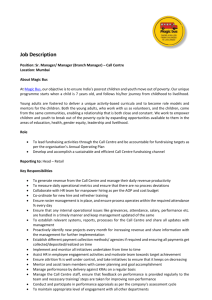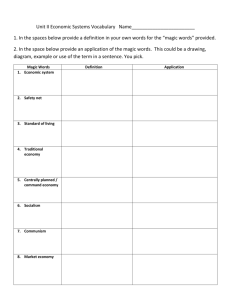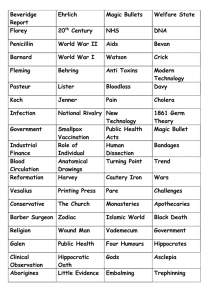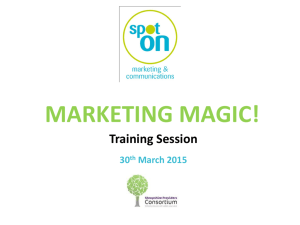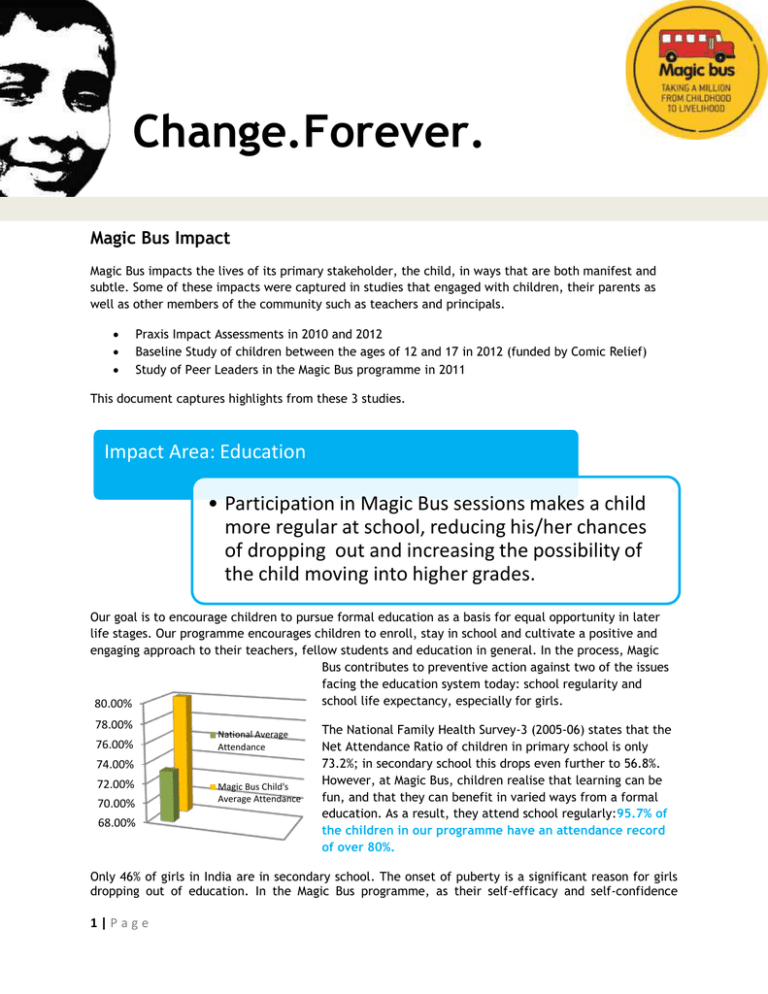
.Change.Forever.
Magic Bus Impact
Magic Bus impacts the lives of its primary stakeholder, the child, in ways that are both manifest and
subtle. Some of these impacts were captured in studies that engaged with children, their parents as
well as other members of the community such as teachers and principals.
Praxis Impact Assessments in 2010 and 2012
Baseline Study of children between the ages of 12 and 17 in 2012 (funded by Comic Relief)
Study of Peer Leaders in the Magic Bus programme in 2011
This document captures highlights from these 3 studies.
Impact Area: Education
• Participation in Magic Bus sessions makes a child
more regular at school, reducing his/her chances
of dropping out and increasing the possibility of
the child moving into higher grades.
Our goal is to encourage children to pursue formal education as a basis for equal opportunity in later
life stages. Our programme encourages children to enroll, stay in school and cultivate a positive and
engaging approach to their teachers, fellow students and education in general. In the process, Magic
Bus contributes to preventive action against two of the issues
facing the education system today: school regularity and
school life expectancy, especially for girls.
80.00%
78.00%
76.00%
National Average
Attendance
74.00%
72.00%
70.00%
68.00%
Magic Bus Child's
Average Attendance
The National Family Health Survey-3 (2005-06) states that the
Net Attendance Ratio of children in primary school is only
73.2%; in secondary school this drops even further to 56.8%.
However, at Magic Bus, children realise that learning can be
fun, and that they can benefit in varied ways from a formal
education. As a result, they attend school regularly:95.7% of
the children in our programme have an attendance record
of over 80%.
Only 46% of girls in India are in secondary school. The onset of puberty is a significant reason for girls
dropping out of education. In the Magic Bus programme, as their self-efficacy and self-confidence
1|Page
increases, girls aspire to a better and fuller education. As a result, 98% of the adolescent girls at
Magic Bus are in secondary school.
Impact Area: Gender
• A Magic Bus child is more aware of issues
relating to gender equity and rights, and is
therefore better equipped to behave fairly with
people of any gender.
A very important part of Magic Bus’ work is in improving behaviours and beliefs regarding gender.
In a country where sport is seen as inherently masculine, it is a challenge to ensure girls’ participation
in a Sport for Development programme. Yet, 42% of the participants in our programme are girls. This
is the result of extensive work with families
and communities, including formal and
informal meetings, house-to-house visits
and the conscious promotion of young
women as Mentors so that each community
has a trusted and known female role model.
Girls
Our work is among the largest mixed-gender
Boys
programmes in the world.Every child in
Magic Bus plays in mixed gender groups at
least once a week. This is a conscious
attempt to break down barriers between
people of both genders, and to enable them
to see each other primarily as human
beings. It also helps to address challenges they face at home and in their communities, thus
normalizing gender equations.
In many of the areas we work in, child marriages are considered okay, especially in the face of
economic difficulties. However, among Magic Bus children, 81% believe that they should not marry
before 18 years of age, even if there is a problem in the family.
In India, violence against women is common and manifested in several forms including discrimination
and exclusion. 37.2% of women between the ages of 15 and 49 have experienced physical or sexual
violence. It is therefore important to work with young people of both genders to build a greater
understanding of the other, and encourage constructive engagement.
Our children are challenging gender-based discrimination through their presence on playfields. 92% of
children believe that girls and boys have an equal capacity to excel in sports. This shows an increase
of 30% from what the children believed in before joining Magic Bus. 82% of children feel that sports
are as important for boys as for girls and 82.7% believe that it is equally important to invest in a
girl’s as well as a boy’s future.
2|Page
Impact Area: Health
• A Magic Bus child exhibits a high degree of
health-related knowledge, beliefs and
practices.
Our largest area of impact is in health-related attitudes and practices. There is a direct cause and
effect relationship between hygiene and good health. Magic Bus children are aware of this link
resulting in several positive behavior changes that impact their health.
77.52% of children at Magic Bus follow good practices related to personal hygiene including
hand washing, brushing, bathing and cutting nails.
They also follow food- and water-related hygiene practices with 94% of parents reporting
that their children observe food-related hygiene such as washing vegetables and fruits
before cooking or eating.
A key part of our curriculum works at the level of attitudes that translate into healthy habits. Each and
every Magic Bus child (100% of the sample selected) who graduates from our programme believes:
that open defecation is a major health hazard. This is significant especially in light of the
fact that60% of Indians still defecate in the open.
that substance abuse (including smoking cigarettes) is harmful.
that playing sports is crucial to maintaining a healthy mind and body.
Impact Area: Sexual and Reproductive Health
• Young women and girls in Magic Bus have a
higher degree of control over their sexual and
reproductive health.
In India, discussions on sex, reproduction, menstruation and related subjects remain taboo. As a
result, most children have false information regarding this aspect of their lives, and consequently
less control over their sexual and reproductive health.
3|Page
According to the National Family Health Survey-3 (2005-06), only 6.3% of girls/ women who had
never been married had spoken
with a health worker about
menstrual hygiene in the three
months preceding the survey. In
100
Magic Bus, however, 82.66% of
the girls know about and practice
80
% of women who
menstrual hygiene – washing
had access to
their pads and drying them in
health-realted info
60
sunlight, changing their pads
in India
regularly and maintaining genital
40
% of Magic Bus
hygiene to prevent yeast
children who have
infections.
20
acces sto healthrelated info
0
Nationally, only 34.7% women are
aware that consistent condom use
can help prevent HIV and AIDS.
Among Magic Bus children, this
figure is a compelling 92%: which
means that as many as 92% of
children at Magic Bus know that condoms prevent HIV infection.
Nationally, in the age group 15-19 years, 47.4% of girls are undergoing teenage pregnancies,
putting themselves and their prospective child in danger. Girls in the Magic Bus show a markedly
high awareness on this issue. 62.07% are aware that the right age to begin childbearing is 21,
thus giving them more control over their bodies.
In 2007, a study on child abuse commissioned by the Government of India revealed that 53.22% of
children in the country had experienced sexual abuse in some form. Magic Bus teaches children to
protect themselves from sexual abuse. 77.78% Magic Bus children are aware of the difference
between good and bad touch, thus enabling them to make an informed choice regarding the
physical relationships they have with others.
Impact Area: Life Chances
• A Magic Bus child is likely to have improved
self-efficacy, a high level of leadership skills
and the crucial life skills that increase his/her
employability.
4|Page
A fourth and perhaps most significant area of impact is in improving life chances and the right to selfdetermination. Children who graduate from the Magic Bus programme are choosing their own futures
and careers, successfully negotiating with parents and other key adults in their lives to be treated
equally and with dignity. They are also successfully overcoming challenges like patriarchal beliefs and
constraints to emerge as college students, with an eye on their careers, the same as their peer
members from privileged backgrounds.
9 out of 10 of Magic Bus children are first-generation learners getting into higher education or
jobs.
92.42% of school teachers including Principals felt that Magic Bus sessions help a child develop
self-awareness and control and improves her/his decision-making skills.
98% school teachers, including Principals, felt that Magic Bus sessions are fun, and help
strengthen inter-personal relationships, enhance teamwork, and help children realize their
potential.
Magic Bus children display leadership in action: 97% have taken up issues and worked on
resolving them within their communities.
Many, like Gaurang and Gulafsha (read her story in the case story section of the Magic Bus website)
have decided to initiate their own initiatives to promote the right of girl children to choose and decide
for themselves.
5|Page

